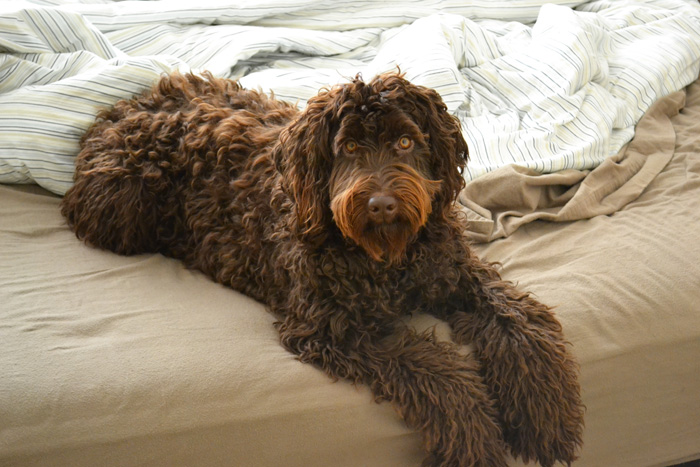 Charlie the Labradoodle is ready for bed.
Charlie the Labradoodle is ready for bed.
Sleep, or a lack of it, has been on my radar lately. And when something is at the forefront of your consciousness, your reticular activating system serves to make you aware of information relating to that something. For me, the information has come in the form of some Globe and Mail articles, a vegan cookbook, and a TED talk. It’s so interesting when different angles on the same subject come together.
Brendan Brazier on Nutrition’s Influence on Sleep
I recently interviewed Brendan Brazier for GranvilleOnline.ca, and have been fascinated by what he has to say about sleep in his new book, Whole Foods to Thrive – part vegan cookbook, part healthy living guide, and part environmental action plan.
Brazier mentions how numerous studies emphasize how much sleep we need, but he argues that the quality of sleep is what we should be most concerned about, and that quality of sleep is directly related to our diet. One major source of stress is nutritional stress – up to 40% of overall stress, says Brazier – brought on by a diet that includes empty calories, processed foods, and other nasties.
High stress levels result in high cortisol levels, a hormone with many effects, including disrupting our delta-phase sleep – “the phase in which growth hormone is released, naturally triggering cellular repair and regeneration.” So one major way to improve sleep is to improve diet. Read more about Brazier's take diet and nutritional stress here.
Arianna Huffington Encourages Women to Sleep Their Way to the Top
Below is a great TED talk on sleep with Huffington Post co-founder Arianna Huffington. My favourite quote from the video:
“The way to a more productive, more inspired, more joyful life is getting enough sleep. And we women are going to lead the way in this new revolution, this new feminist issue – we are literally going to sleep our way to the top. Literally.”
Sleep Deprivation is a National Epidemic. And It’s Killing Us, Says The Globe and Mail
“Because sleep is when the body and especially the brain regenerate and repair themselves, sleeplessness has been identified as a factor in an endless list of afflictions, including hypertension, heart disease, diabetes, obesity, memory loss, bipolar disorder, reduced immunity, mood swings, impaired carbohydrate metabolism and increased heart-rate variability. Not to mention depression and substance abuse and the impairment of memory, self-expression and the ability to read emotions in others. Oh, and a hundred thousand motor-vehicle accidents a year” Read the whole Globe and Mail article here.
Another Globe and Mail article, by Toronto-based dietitian Leslie Beck, offers “Eight ways to get a better sleep.”
Sleep Well, Fellow Insomniacs
If you, like me, struggle with getting enough sleep, I hope you’ll find this information helpful. I’ve never been a good sleeper but there are a few rules I follow that usually have me counting more, and better quality, sheep.
Number one is not eating less than three hours before I got to bed. Sleeping is for repair and regeneration, not digestion, so it’s important that processing the food in your gut is not on your body’s night time to-do list.
Number two is reducing external stimulation as it gets closer to bed time. Bright lights, lively music, TV screens and computer monitors are things that should be avoided in at least the hour before hitting the sack.
And lastly, I like to do some easy reading once I’m all tucked in. By easy reading, I mean nothing too heavy or disturbing, and without any calls to action (I’ve restricted self-help books from my night time repertoire as they’re likely to have me itching to get out of bed and put their advice into action).